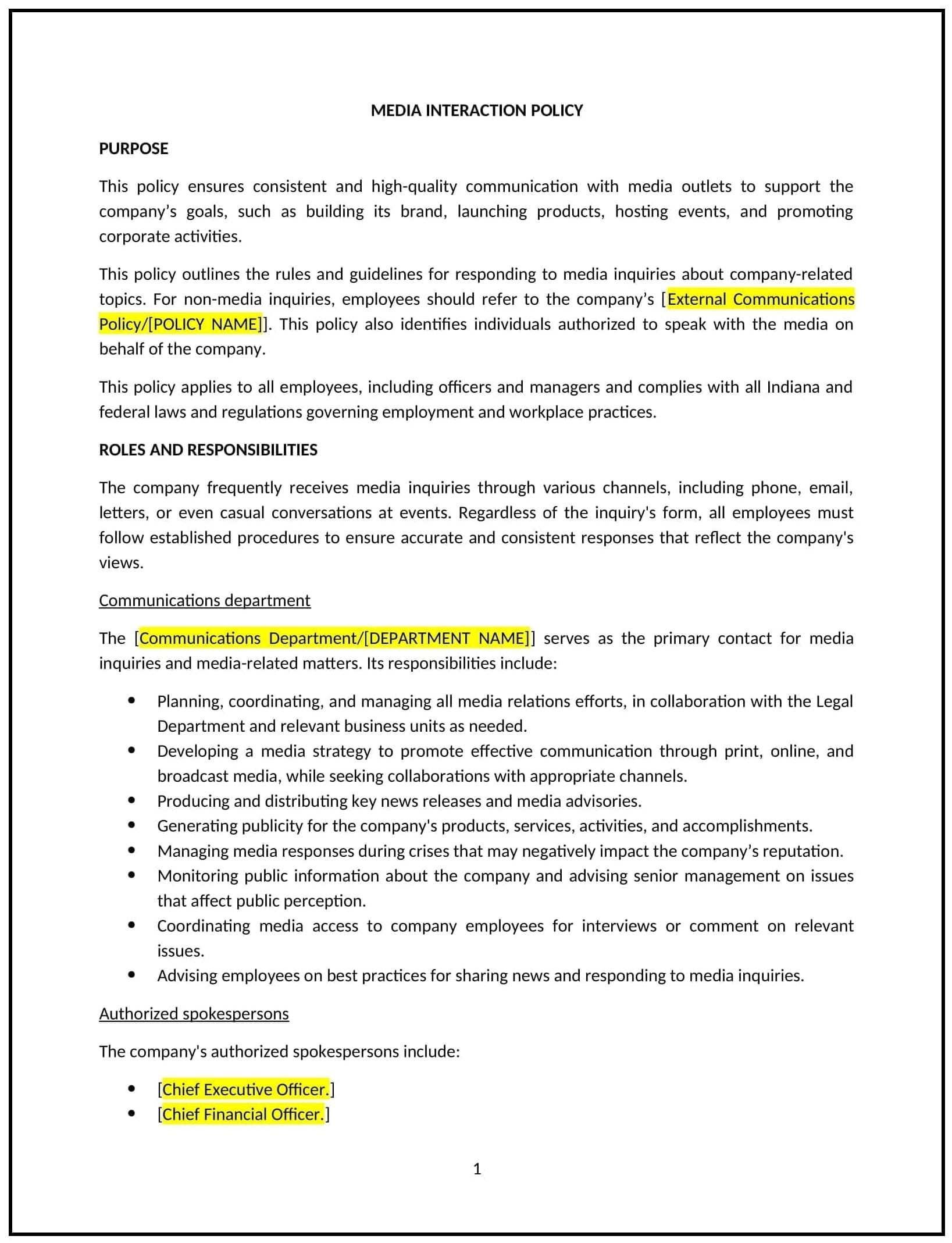Got contracts to review? While you're here for policies, let Cobrief make contract review effortless—start your free review now.

Customize this template for free
Media relations policy (Indiana): Free template
The media relations policy helps Indiana businesses establish clear guidelines for interacting with the media and managing public communications. This policy outlines the process for responding to media inquiries, identifying spokespersons, and ensuring consistent, accurate, and timely communication with journalists and the public. It also addresses how sensitive or crisis-related issues should be handled. By using this template, businesses can protect their reputation, control their messaging, and ensure that their communications are aligned with company values and legal requirements.
By implementing this policy, Indiana businesses can improve media engagement, avoid miscommunication, and maintain a positive public image while safeguarding the organization’s interests.
How to use this media relations policy (Indiana)
- Designate official spokespersons: Identify the employees who are authorized to speak to the media on behalf of the company, such as the CEO, PR manager, or other senior executives. The policy should make it clear that only designated spokespersons can engage with the media to ensure consistent and accurate messaging.
- Set procedures for handling media inquiries: Outline the steps employees should take when they receive a media inquiry. This includes directing inquiries to the appropriate spokesperson, ensuring that all responses are timely and professional, and using the proper channels for media communication. The policy should establish a clear process for how media inquiries will be managed.
- Ensure consistent messaging: The policy should emphasize the importance of consistent messaging across all communications, including press releases, interviews, and social media interactions. Establishing key message points and company-approved responses to common topics will help maintain consistency.
- Address crisis communication: Include guidelines for handling media relations during a crisis or sensitive situations, such as a product recall or a public relations issue. The policy should define how crisis communications will be managed, including when to issue public statements and how to handle difficult or controversial questions.
- Define approval processes: Establish a process for reviewing and approving media communications, including press releases, statements, and responses to media inquiries. This ensures that all communications are aligned with the business’s goals and messaging, and helps maintain quality control.
- Maintain confidentiality and discretion: Outline the importance of confidentiality in media relations. Employees should be reminded not to disclose confidential information, proprietary data, or internal company matters when engaging with the media. The policy should specify what types of information are off-limits and how employees can determine what can be shared.
- Provide media training: Offer media training to designated spokespersons to ensure they are prepared for interviews and other interactions with journalists. The policy should specify how often training will be conducted and the expectations for spokespersons to effectively communicate the company’s message.
- Address social media: Include guidelines for how employees should handle media-related interactions on social media platforms. The policy should specify that social media posts regarding company matters should align with official messaging and be vetted by the appropriate spokesperson before being shared publicly.
- Clarify consequences for policy violations: The policy should explain the potential consequences for employees who violate the media relations policy, such as speaking to the press without approval or disclosing confidential information. This ensures accountability and protects the company’s public image.
Benefits of using this media relations policy (Indiana)
Implementing this policy provides several key benefits for Indiana businesses:
- Protects company reputation: A clear media relations policy helps businesses ensure that their public image is managed carefully and consistently, reducing the risk of negative press or misinformation.
- Provides clarity and consistency: The policy helps employees understand the company’s expectations regarding media interactions, ensuring consistent messaging and responses across all channels.
- Reduces legal risks: By maintaining control over media communications and ensuring that sensitive or confidential information is not disclosed, the policy helps reduce the risk of legal issues or damage to intellectual property.
- Enhances media relationships: A well-organized and professional media relations strategy fosters positive relationships with journalists and the media, ensuring better coverage and understanding of the company.
- Manages crisis communications: The policy provides a framework for managing communications during a crisis, ensuring the company can respond promptly and appropriately to protect its reputation.
- Improves employee understanding: By setting clear expectations, the policy ensures that employees understand their role in media relations and are better equipped to support the company’s communications strategy.
Tips for using this media relations policy (Indiana)
- Communicate the policy clearly: Ensure that all employees, particularly those in public-facing roles, are aware of the media relations policy and understand the procedures for handling media inquiries. This can be communicated through employee handbooks, training sessions, and regular reminders.
- Train designated spokespersons: Provide ongoing training for the employees designated to speak with the media to ensure they understand the company’s messaging, are prepared for difficult questions, and know how to handle media interviews effectively.
- Monitor media coverage: Regularly monitor the media to track coverage of the business and assess whether the messaging aligns with the company’s communication goals. This can help identify potential issues early and ensure that responses are timely and appropriate.
- Foster good relationships with journalists: Cultivate positive relationships with journalists and media outlets by providing them with accurate, timely, and useful information. This can help ensure better coverage and create opportunities for positive press.
- Stay updated with changes in media landscape: Keep the policy current by reviewing it periodically to ensure that it addresses new forms of media, such as social media platforms, and reflects changes in communication practices or regulations.